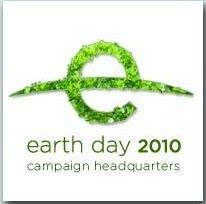As bloggers all over the globe join in the global movement to make the stance in climate change,
Blog Action Day has targeted this year to select Climate Change as this year's topic. Currently there are some 8,872 blogs registered for this movement and 148 countries involved. Also as October 24th nears , the International Day of Climate Action, this is just adds to it.
In Bangladesh, recently they initiated a project to
offset climate conference emissions where all outdated brick kilns are to be replaced which will reduce 50,000 tonnes of CO2 hoping to make the COP 15 carbon neutral.
Some southern regions of Bangladesh are losing ground due to the rising sea-levels. Now according to current CO2 emissions of 400-450ppm of C02, it is expected that sea-levels would rise by 25-40m. So that would mean most of Bangladesh would be under-water. For a developing nation which highly depends on its agricultural output, rising sea-levels will reduce agricultural land to a minimum. This resulting in food crisis. As poverty is still a problem, inflation in this sector will create, one of the largest hunger nation.
Aside from the food problem, habitable land will reduce making living for over 162,221,000 people quite impossible. It is quite noticeably that weather patterns in Bangladesh have changed. Our monsoon season has shifted forward by a certain time. In fact this year 2009, our popular Kal Bohshaikh was shifted by more than 15 days. Kal Boishaikh is basically the time when the monsoon season begins which is sometime in April.
Also we hardly have any winters. The winter of 2008-2009 only lasted over a month which started late-December and ended sometime in early February. Surprisingly also before it would not rain in the winters, it would remain dry. However as I noticed it over 12 years starting from 1997 to 2009, there is a tendency of rain in the winters for the last 2 or 3 years.
For us Climate Change is already in motion, we are facing it and in the near future it will become worse. Even though our CO2 emissions are in the thousands, we still need to be prepared. As a low-lying country, floods are really not a big deal. It is kind of a norm and people are used to it. But in the near future, floods will become devastating, even for us it will be difficult. As we lack infastructure it will be very difficult to sustain regular flooding. It is estimated that it would cost $100bn to tackle climate change and most of the money will go into water protection systems but we would require more than that. As it is impossible for our country to generate that much money, we would then become highly dependent on foreign aid, thinking about it we are already dependent on foreign aid.
In order for Bangladesh to avoid from becoming like Maldives, I request all UN officials, diplomats,delegates to make the right decision. This is such a decision, that the fate of the entire world is in your hands.







